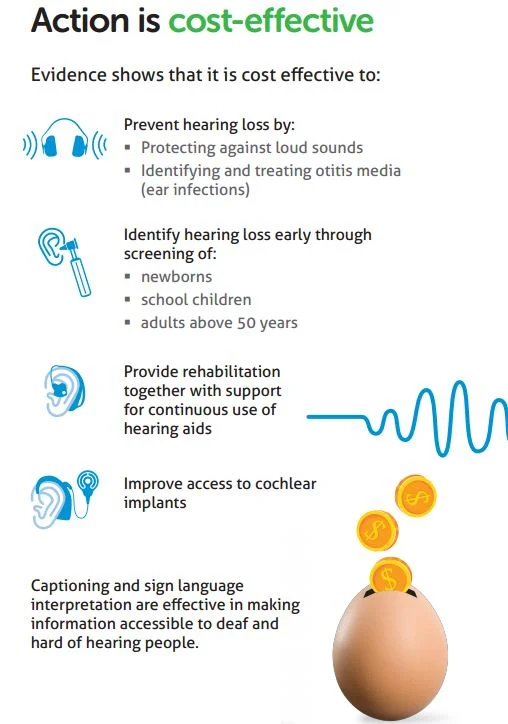By Frankie Huang
In honor of World Hearing Day, which takes place on March 3 every year, Hearing Health Foundation is joining forces with the World Health Organization (WHO) to draw attention to the economic impact of hearing loss and the importance of treating hearing loss.
Did you know the economic cost for unaddressed hearing loss is estimated to be $750 billion globally? In the U.S. individuals with untreated severe to profound hearing loss are expected to cost society $270,000 each over the course of their lifetimes. Most of these costs are due to reduced productivity in the workplace, although the use of special education resources among children and other social services are also factors.
Lifetime earnings for those with untreated hearing loss average 50 to 70% less than their typical-hearing peers in the U.S., and has been shown to negatively impact household income up to $12,000 per year, on average, depending on the degree of hearing loss, according to the Better Hearing Institute. This is largely due to having fewer opportunities for promotions, reduced job performance, and decreased earning power.
Beyond economic losses, untreated hearing loss can significantly impact a person’s quality of life. Researchers have found that individuals with untreated hearing loss are more likely to develop depression, anxiety, and feelings of inadequacy. They may also avoid or withdraw from social situations. Left undetected in children, hearing loss can negatively impact speech and language acquisition, academic achievement, and social and emotional development.
Prevention, screening for early identification, early intervention, and rehabilitation through hearing devices are among the strategies that mitigate hearing loss and its consequences. Those who treat their hearing loss with hearing aids and/or cochlear implants show improvement in social, emotional, and psychological well-being. Interventions can significantly decrease isolation, increase self-esteem, and lead to better employment opportunities and earnings—all of which will benefit society as a whole.
For World Hearing Day 2017, the WHO has joined forces with Mimi Hearing Technologies. To raise awareness of hearing loss, Mimi hopes to have 1 million people test their hearing. To do this, they are offering the Hearing Test app on iOS free for everyone. If you suspect you or a loved one may have hearing loss, this is a great opportunity to test your hearing with Mimi’s Hearing Test, which is an initial online assessment. The results may require a follow-up appointment with a hearing health professional. However, by detecting signs of hearing loss early on the benefits of treating hearing loss far outweigh the consequences if left untreated.





